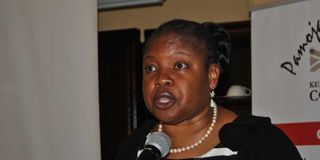Report reveals how parties bribed voters and botched their nominations

KHRC Executive Director Atsango Chesoni at a past function. Kenya rights groups on April 14, 2015 condemned the suspension of two key Muslim civil society organisations for suspected links to Somalia's Al-Qaeda-linked Al-Shabaab, saying it will damage efforts to counter extremism. FILE PHOTO | ANTHONY OMUYA | NATION MEDIA GROUP
What you need to know:
- The report says the process of preparing party membership lists was marred by fraud, with some parties enticing the public with gifts and money to join them.
- Apart from the chaotic and shambolic party primaries, KHRC researchers who claim to have monitored the situation months ahead of the 2013 General Election, said there were reports of voter intimidation in Naivasha three months to the historic polls, which nevertheless turned largely peaceful.
- In parts of Migori and Homa Bay counties, there were cases of intimidation of women candidates, with a group of youth said to have invaded and disrupted a rally organised by Homa Bay County candidate for the post of Women Representative Gladys Wanga.
Most political parties bribed voters, sponsored violence and conducted sham nominations, a report by the Kenya Human Rights Commission (KHRC) has shown.
The report says the process of preparing party membership lists was marred by fraud, with some parties enticing the public with gifts and money to join them.
Last-minute defections were the order of the day despite attempts to stop them, shows the report titled Democratic Paradox released by KHRC executive director Atsango Chesoni.
It also alleges that the Registrar of Political Parties, Ms Lucy Ndung’u, cleared 59 political parties without closely scrutinising data they had submitted especially the authenticity of their party membership lists.
She reportedly allowed political parties to substitute a legal process of filling forms to ensure parties did not recruit ghost members or cross-list members from other parties, to a “software package” that allowed them to upload unverified personal data of members into the official register.
CHAOTIC PRIMARIES
Political parties are also accused of contributing to the chaotic party primaries by conducting them on January 17, the last day of presenting the lists to the independent electoral and boundaries commission (IEBC) despite being allowed a two-week period to conduct the polls.
Despite having formed coalitions, the KHRC report says parties went on to conduct independent primaries, with the Wiper and ODM that belonged in Cord coalition holding theirs on January 16 and Jubilee coalition members The National Alliance party (TNA) and the United Republican Party (URP) holding theirs a day later.
On party hopping, it says politicians did not subscribe to the ideology of the parties that they purported to belong to but rather they approached them as mere vehicles for contesting for power.
Among candidates accusing of flouting the rules set out in the Political Parties Act by defecting to other parties, include Mr Abdallah Mwaura, who defected from Wiper to TNA.
Mr John Mututho, who was seeking re-election as MP for Naivasha, and currently the chairman of Nacada, is said to have defected from TNA to Narc, headed by former Cabinet minister Martha Karua.
Others listed are former Nairobi Town Clerk Phillip Kisia, who defected from ODM to FPK to vie for Nairobi’s governor’s position, and ex minister Soita Shitanda, who defected from UDF to New Ford Kenya, as did former MP Noah Wekesa, who was seeking the governor’s position and defected from Ford Kenya to ODM.
The report lists 26 candidates who defected, with all the major parties implicated, including President Kenyatta’s TNA and that of his deputy William Ruto’s URP having either received candidates who defected or benefited from defections.
Other glitches during the polling day included use of substandard voting materials such as buckets instead of proper ballot boxes, delayed delivery of voting materials and missing candidates’ names and pictures.
Most parties also did not use member lists but instead relied on IEBC’s voter register, hence the primaries did not reflect the will of the members who had subscribed to the parties.
OCCASIONAL CORRUPTION
There were apparently skewed nominations of women and the disabled, despite efforts to lower their nomination fees.
“The poor coordination, mismanagement and occasional corruption that marked the recruitment and nomination processes illustrated the indifference of most political parties to the popular will, the report shows.
“It also demonstrates the incapacity of the relevant party leaders to effectively address the entrenched cultures and malpractices with political parties in the country,” notes the report.
Apart from the chaotic and shambolic party primaries, KHRC researchers who claim to have monitored the situation months ahead of the 2013 General Election, said there were reports of voter intimidation in Naivasha three months to the historic polls, which nevertheless turned largely peaceful.
“Workers in flower plantations from the Luo, Kisii, and Luhya communities had their salaries slashed to Sh5,850 per month while others continued to be paid Sh8,000 per month. There were fears that the said communities would be sacked,” it says.
In Uriri constituency, Migori County, leaflets written in Dholuo language recommended that a specific clan take control of elective positions.
“During the election period, we witnessed a breakout of violence in some parts of the country....” said Ms Chesoni.
WOMEN INTIMIDATED
In Embu County, there were episodes of violence with some 500 youths said to have disrupted a Cord rally on February 15, by chanting ‘Jubilee! Jubilee!’ after some leaders criticised Jubilee presidential candidate Uhuru Kenyatta.
In parts of Migori and Homa Bay counties, there were cases of intimidation of women candidates, with a group of youth said to have invaded and disrupted a rally organised by Homa Bay County candidate for the post of Women Representative Gladys Wanga.
Goons belonging to a group allied to a senior politician reportedly torn the dress of the aspirant for Migori County governor’s seat Ann Anyanga.
Other incidents of intimidation of women candidates were reported in Embakasi East constituency in Nairobi County, Kitui County and Kajiado County reads the report.





